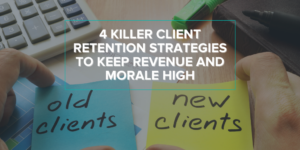
4 Killer Client Retention Strategies to Keep Revenue and Morale High
Some facts just don’t stick no matter how simple they are. Yes, we know we should drink more water, floss every day, and refill the gas tank before the light comes on. And, in business, we know it costs less and achieves more to retain an existing client than to sign a new one. Nevertheless, many (or dare I say… most) brands and agencies continue to put new business ahead of existing client retention.
When you build and grow trust, your clients will not only continue to use your product or service (and pay you), but also advertise your brand – usually without asking for anything in return. Not only does retention keep the lights on, it shows exactly how loyal and satisfied your clients are. The numbers don’t lie:
- Increasing customer retention rates by only 5% increases a company’s profits by 25-95%. (Harvard Business School)
- 82% of companies state that customer retention is far cheaper than customer acquisition. (Econsultancy)
- About 20% of customers are lost by an average business annually, due to lack of cordial relationship. (Marketing Wizdom)
- 83% of customers will recommend your brand to others if they trust the brand. While 82% will stick to your brand if they trust it. (Concerto Marketing Group)
Focusing on retention keeps both revenue and internal morale high. Not only does it cost less than customer acquisition, but clients are willing to spend more money as time goes on. Then, as they become more invested in your brand, loyal clients share their positive experiences and morph into brand ambassadors, discussing your product or service with friends and former colleagues at other companies or agencies.
Here are four killer retention strategies your company can adopt right now:
1) Actually listen and adapt to client feedback.
I’ve worked across industries, from a SaaS startup that felt like one very long episode of “Silicon Valley” to an old school Madison Avenue ad agency (sexism included!) and, unfortunately, have seen a lot of companies not value their clients. They claim to appreciate feedback, but then either ignore it or offer a watered-down version of the original ask.
Don’t run away from feedback, or what they actually are, complaints. Clients who reach out to share their pain points are an incredible marketing asset. They show you exactly how users are implementing your product or service, which is often different from your original intention. Even better, complaints mean that the clients care and want to see improvements made in order to continue working with you. It’s the people that ghost with no feedback or explanation that hurt business, not the ones who want to negotiate a middle ground.
2) Build client partnerships.
This takes time and energy. By “partnerships” I mean consistent communication with scheduled monthly meetings to help market your services with actionable accountability. Don’t just offer steep discounts and slap each other’s logos on your website. You might find that your partner’s clients are more open and honest with feedback than your own team members because they don’t work with your you directly (and thus feel more open).
Partnerships are built on human-to-human connection, first and foremost. You won’t fight for a partnership with a company if you hate working with them, no matter how aligned your services or industries. Take the time to learn about the people behind buying decisions through personality playbooks like Crystal Knows.
3) Focus on quality customer service over quick response times.
Better to wait for a thoughtful answer that addresses a question head on, then to hear “I don’t know” within the hour. According to research from Gallup, customers were nine times more likely to be engaged with a brand when they evaluated the service as “courteous, willing, and helpful.” “Speedy” service, on the other hand, only made customers six times more likely to be satisfied.
Customer service teams shouldn’t be pressured to close XX number of tickets per day. This will only make clients feel rushed or belittled. Speed is only beneficial if it delivers exactly what your client is asking for. In fact, research conducted by John Goodman found that clients were more likely to churn due to price increases when they also felt that customer service didn’t meet their quality standards.
4) Then, craft customer service KPIs.
All organizations use KPIs to evaluate their success at reaching targets (hopefully). Key performance indicators help map out goals and expectations for your business, highlighting the direction to take to get there. Early on, establish KPIs with new clients to measure the efficacy of your relationship. If a new client states that their goals are X, Y, and Z, and they accomplished those objectives at the end of the working relationship, it will be easier to continue working together. Ensure everyone clearly understands the goals and how you will measure impact, then schedule check-ins to review progress.
KPIs will reveal how invested clients are in your product or service (thus, proving value). Plus, it will also allow you to see exactly where churned clients shifted their behavior. With this information, you can identify and rectify problem areas in customer service for additional client retention.
Bonus) Shout out your clients on social media.
Everyone loves free press. Before you need to fight for client retention, make a habit of tracking their updates and accomplishments. By staying up to date on your clients’ businesses and taking the time to highlight them online, you position your company as an ally with a vested interest in their success. Winmo’s company-based alerts is an easy way to stay up-to-date on client, and lead, activity.





